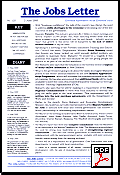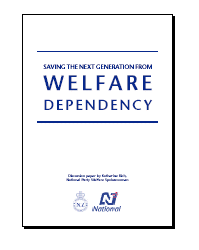



|
 |

|
| No.186 | 4 June 2003 | Essential Information on an Essential Issue |
of key events over the last few weeks. NATIONAL ON WELFARE DEPENDENCY MAHAREY AND BRADFORD RESPSOND BENEFICIARY NUMBERS RISE WHILE UNEMPLOYMENT FALLS READING: WE DONíT DO TOO BADLY PAY RATES FOR NOT-FOR-PROFITS US BOOM IN POT AND PORN  LAST Letter
LAST Letter
NEXT Letter   Download this issue as a PDF file
Index to Features
13 May 2003 The Australian Budget predicts the country's unemployment rate will remain at about 6% and the economy will grow at 3% this year. Australian workers will get a $4 - $11 per week pay rise as the Budget lifts the personal income tax bracket thresholds. 15 May 2003Methanex in Taranaki tells its 220 workers that their jobs are guaranteed until at least next year. Managing director Bruce Aitken says that any decision to mothball the methanol producing plants will be made on the basis of whether new gas discoveries are found that can supply the plants. The Maori Television Service will hire 140 staff by August in preparation for going on-air by the end of the year. 17 May 2003 Burnside Military Camp near Nelson may be hosting a new life skills training programme for young offenders. Nelson Mayor Paul Matheson and the local Winz office are working to launch a pilot Limited Service Volunteer programme. The initiative will be part of the Mayors Taskforce for Jobs partnership with government to have all young people in work, education or training. 18 May 2003 Job cuts are imminent at the Norske Skog newsprint mill in Kawarau, according to chief Rob Lord. One in seven secondary schools have had to cut subjects or transfer courses this year because they could not find qualified teachers, according to the PPTA. About half of schools could not get the right teachers for vacancies and were forced to ask teachers to teach subjects they had no specialty training in. The PPTA says that the deteriorating staffing situation has been alleviated only by the recruitment of overseas teachers. The German unemployment rate reaches 10.7% of the workforce. 19 May 2003 130 jobs will go as glass components manufacturer Pilkington Automotive plans to close its Lower Hutt factory in September. Wainuiomata residents petition the owners of the Griffins biscuit factory not to relocate the business from the area. Retired man George Paramore, who collected 4,000 signatures, says the closure of the factory would be disastrous for the community. Fewer seasonal pipfruit workers are returning to the dole after the season ends, according to the Winz Motueka office. Centre manager Kate Rose says new strategies are placing people who are finishing the fruit harvest into work in other seasonal industries like fishing. An International Labour Organisation report forecasts Pacific Rim countries, including NZ, may lose up to 15% of their tourism sector jobs due to the recent falling-off of international travel. 120,000 NZ jobs are estimated to depend on tourism. 20 May 2003Job losses are expected at Pacific Steel, a wire-making factory in Auckland, as it moves from a seven-day to a five-day work week. The company blames the high NZ dollar, a weakening rural economy, cheap foreign competition and the power crisis. Telstra cuts 4,000 more Australian jobs. 21 May 2003 30 jobs are lost as Empower, a subsidiary of Contact Energy, is merged into the parent company. Parent's Centre president Sharron Cole criticises the Budget increase of funding for longer childcare hours for workers' children. Cole says the move sends a clear message to parents that government expects them to work as long as possible and to fit their children into their lives only as work allows. The National Party says parents on welfare should have their benefit reduced if their children don't go to school. Leader Bill English believes that sanctions should be applied if a parents takes no steps to tackle their children's truancy. The Bank of NZ says the economy will struggle to grow 2.5% this year primarily because our economy is so exposed to North Asia, which is suffering economically due to the SARS epidemic. International visitor numbers to NZ in March - April were down 1% on last year according to Statistic NZ. Over each of the last three years, visitor numbers have increased by 5% - 11% per year during the March — April period. Statistics NZ says the slowdown may reflect people's reluctance to travel due to the risk of contracting SARS. 23 May 2003 A New Zealand Herald editorial says that any punitive solutions to truancy problems must apply to working parents as well as beneficiaries. It says the risk of truancy is probably as great in households in which no parent is at home as it is in families supported by welfare. The Herald: "Furthermore, it should not be assumed that truancy is a problem of relative poverty or that children are the only offenders." In the US, Master of Business Administration (MBA) graduates are finding it increasingly difficult to find a job. Even high profile business schools say placements are about 20% below what they were five years ago. Peter Degnan of Wharton School in Philadelphia says that some students are now looking for work in non-profit organisations, a sector that MBA graduates have largely ignored. 24 May 2003 Private sector employers are angry they are not being represented on a government taskforce to promote gender pay equity among public servants. Business NZ executive director Anne Knowles says that the public sector labour market has a huge impact on the private sector and private employers should at least have a watching brief on the taskforce. 26 May 2003 26 laboratory jobs are cut at dairy company Fonterra's Kauri factory near Whangarei. The company says other laboratories will eventually be affected as all final product testing for its factories north of Taupo will ultimately be carried out at Te Rapa, in the Waikato. The debate about raising the age of retirement must take into account manual workers and how onerous it would be for them, according to a Massey University study. Older Worker Employment Transition found that workers want to make their own decision about when to retire and the paper supports the abolition of compulsory retirement on grounds of age. 29 May 2003 Finsec, the bank workers union, predicts the take-over of The National Bank by the ANZ will result in job losses. General secretary Andrew Cassidy says that each bank merger in the past has resulted in hundreds of lost jobs.
 LAST Diary
LAST Diary
NEXT Diary 
|
NATIONAL ON WELFARE DEPENDENCY
While Rich agrees with the government that most people want to work, she argues that the current welfare system undermines people's ability to do just that. She believes the welfare system should encourage people to choose work and one way to do that is to offer financial incentives. These are likely to mean higher tax credits for those in work, childcare subsidies for people returning to work, and increased benefit abatement rates (for people earning while on a benefit) so there is a greater incentive to take up full-time work and leave the benefit system.
The Welfare Dependency discussion paper suggests National would make big changes to Winz by eliminating its monopoly on government funded employment placement services and contract them out, similar to a system Australia introduced in 1998. Rich: "Contracting out employment services to private sector and community groups should be considered. National believes non-government organisations should have the opportunity to play a much greater role in the assessment and placement of beneficiaries into work." 
can be downloaded (27pg, 485kb) from the National Party website
Source — "Saving the Next Generation from Welfare Dependency"; New Zealand Herald 20 May 2003 "Beneficiaries must give and take say National" by Colin James; New Zealand Herald 20 May 2003 "Colin James: How to draw the line and make welfare work in troubled times"
MAHAREY ON WELFARE DEPENDENCY Minister of Social Policy Steve Maharey says the bulk of the policy ideas in
National's Welfare Dependency discussion paper are lifted straight from their controversial 1998
Code of Social Responsibility. Other ideas, like work-for-the-dole, were tried by a National government and failed. Minister of Social Policy Steve Maharey says the bulk of the policy ideas in
National's Welfare Dependency discussion paper are lifted straight from their controversial 1998
Code of Social Responsibility. Other ideas, like work-for-the-dole, were tried by a National government and failed.
Maharey: "Let's take a look at the evidence: work-for-the-dole failed according to the evaluation Roger Sowry himself commissioned. The evaluation showed beneficiaries who received no help at all from Work and Income were more likely to move into paid work than those trapped in the make-work scheme; time limits on benefits won't work because the state will have to find some way of supporting people who have not been able to find work, as experience in other countries shows; work-testing sole parent beneficiaries failed because what they actually need is the kind of one-to-one support to be an effective parent and to move into work that the current government is now providing." Maharey says it is "deeply ironic" that National is coming up with these "beneficiary bashing" ideas at a time when the number of working age beneficiary numbers has declined. As National left office in 1999, the number of working-age beneficiaries was 386,000. Since then it has dropped to 345,000 people. Source — Press release NZ Government 28 May 2003 "Nats don't believe own welfare policy"BRADFORD ON WELFARE DEPENDENCY Green MP Sue Bradford says Katherine Rich should not overlook the obvious: that people
are on the unemployment benefit because they can't get a job. Bradford told Radio NZ's
Nine to Noon: "If you have well over 100,000 people looking for work, and I suspect the figures are much higher
than that, then that is the primary cause of people being on benefits: the lack of jobs. The fact there are
not enough jobs to go around is not the fault of the people without them." Green MP Sue Bradford says Katherine Rich should not overlook the obvious: that people
are on the unemployment benefit because they can't get a job. Bradford told Radio NZ's
Nine to Noon: "If you have well over 100,000 people looking for work, and I suspect the figures are much higher
than that, then that is the primary cause of people being on benefits: the lack of jobs. The fact there are
not enough jobs to go around is not the fault of the people without them."
Bradford is adamant that providing enough jobs is the key to eliminating unemployment, not welfare reforms that make beneficiaries' lives harder: "We won't end unemployment until there are enough jobs to go around. At the moment we are about 150,000 jobs short. The solution is a deliberate job creation policy that would see the government, councils and community groups all creating jobs, jobs that have real purpose and pay real wages. There could be a lot more jobs created in the community sector if the Ministry of Economic Development put money into the community sector rather than only into the business sector." Bradford does not accept that people should have to work for the small amount of money they get from welfare and she maintains that coercion is not the answer. She says that most people who are out of work are desperate to get a job. Bradford agrees there are some people who prefer to avoid work and that this is a problem, but it should not be the driver behind welfare policy. Source — National Radio Nine to Noon interview of Sue Bradford 30 May 2003
BENEFICIARY NUMBERS RISE AS UNEMPLOYMENT FALLSDavid McLoughlin reports in The Dominion Post that Treasury figures in the recent Budget show that the welfare figures will remain the same over the next year — with 348,000 New Zealanders aged 18-65 years on a benefit. But he points out that this number is 54,000 more than in 1991 ... when the unemployment rate hit a high of 11% before falling to its present 5% level. In 1991, 294,000 working-age New Zealanders were on welfare. Half of them (147,000) were on the unemployment benefit. Now, the number of those getting the unemployment benefit is predicted to fall to just over one third of working-age beneficiaries ... while those paid the sickness and invalids benefits fore forecast to rise (from 17% in 1991 to about a third of all beneficiaries next year). Source — The Dominion Post 26 May 2003 "Benefit rolls rise as unemployment falls" by David McLoughlin
Source — Treasury Budget Tables 2003, The Dominion Post
READING: WE DON'T DO TOO BADLY In The Jobs Letter No 184 we reported a wide gap between the reading skills levels
of New Zealand girls and boys. Bruce Adin, president of the Education Institute, however, says this
does not draw a complete picture. The Progress in International Reading
Study (PIRLS), which tested the reading levels of nine and ten year old children in 35 countries, found that while the gap between
girls and boys is wider in New Zealand than in many countries, girls read better than boys in all of the
35 countries surveyed. In The Jobs Letter No 184 we reported a wide gap between the reading skills levels
of New Zealand girls and boys. Bruce Adin, president of the Education Institute, however, says this
does not draw a complete picture. The Progress in International Reading
Study (PIRLS), which tested the reading levels of nine and ten year old children in 35 countries, found that while the gap between
girls and boys is wider in New Zealand than in many countries, girls read better than boys in all of the
35 countries surveyed.
Adin says that in reading and writing, New Zealand children don't do too badly. The reading skills level of our children overall is above the international average. In the PIRLS study, NZ children are highly represented among the top readers (17% of NZ children read as well as the top 10%) and under represented in the lowest skilled readers (16% in the lowest 25%). Source — New Zealand Herald 15 May 2003 "In reading and writing we don't do too badly" by Bruce Adin
PAY RATES IN THE NOT-FOR-PROFITSMiddleton: "They've got similar skills to every other executive director or chief executive. Except they're paid less, have less money to work with, often deal with far more complicated problems — the sort that aren't solved by pulling rank — and the corporate world, unfairly, often views their skills as non-transferable." Middleton reports that there is a shortage of good middle and senior charity managers who have got a strategic understanding of their sector as well as business skills. And because charity workers do tend to get paid less than in the profit sector "... you'd have to be motivated by things other than money." David Doyle, of the Auckland recruitment company Chamberlin Doyle agrees, and points out that the 30-something graduate middle-manager with a young family is more likely to be motivated by the money than a sense of making a social contribution. Doyle: "They can't afford to make the $20,000 trade-off". Doyle has recently done a study which aims to give not-for-profits an idea of pay rates across their sector (see box, below). Sources — New Zealand Herald 24 May 2003 "Not-for-profit, not for you?" and "Fighting a mission impossible" by Julie Middleton
US BOOM IN POT AND PORN While the official American economy has been suffering a downturn, a new study reports that
the US shadow economy is enjoying unprecedented levels of success. Marijuana production, pornography and
illegal labour have created hidden markets which now account for as much as 10% of the American
economy. This shadow economy is profiled in a new book according to the
Reefer Madness: Sex, Drugs and Cheap Labour in the American Black
Market, by Eric Schlosser (Houghton Mifflin 2003). While the official American economy has been suffering a downturn, a new study reports that
the US shadow economy is enjoying unprecedented levels of success. Marijuana production, pornography and
illegal labour have created hidden markets which now account for as much as 10% of the American
economy. This shadow economy is profiled in a new book according to the
Reefer Madness: Sex, Drugs and Cheap Labour in the American Black
Market, by Eric Schlosser (Houghton Mifflin 2003).
The book points out that no aspect of farming has grown faster in the last three decades than marijuana, and officials with the US drug enforcement administration now estimate that it is the country's largest cash crop. The figures: growing marijuana, has a "plausible" estimated revenue of $25 billion, while growing maize is worth $19 billion. Revenue from hardcore pornography in the US is estimated at about $10 billion ... which is roughly equal to Hollywood's domestic box office takings. Americans spend more money at strip clubs than on Broadway, regional theatres and orchestras combined. Schlosser says America is leading the world in porn production, with about 200 new films being produced every week. There has also been a huge explosion in porn websites — from about 22,000 in 1997 to about 300,000 today. According to Schlosser, the shadow economy thrives with the help of illegal immigrants who are being paid in undeclared cash. He estimates there are more than 8 million illegal immigrants in the US ... with about a million of them being employed as farm workers. Source — Amazon.com reviews of "Reefer Madness" by Eric Schlosser; Guardian Weekly 8 May 2003 "Pot and porn net more than corn" by Duncan Campbell
We are funded by sustaining grants and donations. Yes, you can help.
| ||||||||||||||||||||||||||||||||||||||||||||||||||||||||||||||||||||||||||||||||||||||||||||||||||||||||||||||||||||||||||||||||||||||||||||||||||||||||||||||||||||||||||||||||||||||||||||||||||||||||||||||||||||||||||||||